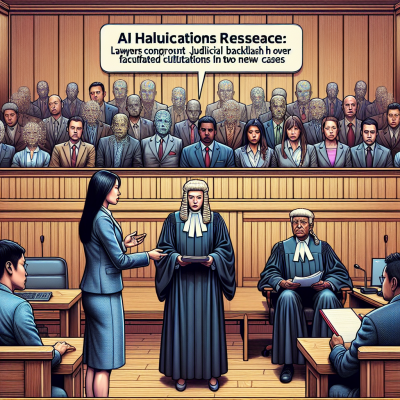
AI-Crafted Legal Briefs Under Fire Once Again
The legal profession is witnessing an unsettling repetition of mistakes, as artificial intelligence continues to infiltrate courtroom submissions. In recent weeks, two more legal cases have surfaced where attorneys submitted court documents riddled with citations to cases that do not exist—generated entirely by AI tools. This growing issue signals a pressing need for increased attorney diligence and possibly new regulations governing the use of generative AI in legal practice.
Revisiting the Pattern: AI Hallucinations in Court
The cases follow the precedent set by earlier incidents like the infamous one involving attorney Steven Schwartz, who faced sanctions after submitting AI-generated arguments and fictitious citations using ChatGPT. While AI tools have proven their value across industries, their reliability in legal research remains highly questionable.
In the two most recent occurrences, attorneys in different courts across the United States relied on AI to assist with their legal briefs. But instead of streamlining legal research, the technology led them astray—fabricating quotes and citations that, upon review, had no basis in case law or even real court decisions.
Judicial Reactions: Mounting Frustration and Warnings
Judges in both cases expressed notable frustration, describing the submissions as a “waste of judicial resources” and a concerning breach of ethical and procedural standards. One judge stated that he was “angry and disappointed” in the attorneys’ lack of oversight, emphasizing that legal professionals are ultimately accountable for understanding and verifying the information they present in court.
These instances underscore how the convenience of AI cannot be a substitute for professional judgment and due diligence. The judiciary is signaling that while innovation in legal tech is welcome, it must not come at the expense of accuracy and credibility.
The Ethical and Professional Standards at Stake
Attorneys have an ethical obligation to verify every fact and citation they present to a court. Under most professional conduct codes, including the ABA Model Rules, lawyers must not knowingly present false statements to a tribunal. Even when mistakes are unintentional—as in these AI-assisted brief submissions—the responsibility falls on the attorney to ensure the veracity of their filings.
These events raise deeper questions about competence in the digital age:
- What constitutes reasonable diligence when using AI tools?
- Are current training and education standards adequate for AI integration into legal practice?
- Should there be regulatory guidance or mandatory disclosures when AI is used in legal work?
The Call for Accountability and Technological Literacy
Courts and bar associations may soon need to step in with clearer policies. Some jurisdictions may consider requiring attorneys to disclose when generative AI tools are used in preparing documents. Others may enhance CLE (Continuing Legal Education) requirements to include AI literacy, emphasizing that legal professionals cannot rely blindly on emerging tech.
This issue is not just about technology—it’s about the duty attorneys owe to courts, clients, and the legal profession itself.
Balancing Innovation with Caution
There’s no doubt that AI, when used appropriately, can increase efficiency in legal work. From document review and e-discovery to drafting contracts and summarizing depositions, AI offers promising benefits. But as illustrated by these cases, unvetted reliance on generative AI can disrupt legal proceedings and undermine the integrity of the justice system.
Instead of viewing AI as a replacement for traditional legal research, attorneys should treat it as a supplementary tool—one that must be used critically and with caution.
Best Practices for Lawyers Using AI Tools
To avoid the mistakes seen in these recent cases, legal professionals should follow these best practices when incorporating AI into their workflow:
- Always verify case citations and legal reasoning with trusted legal databases such as Westlaw, LexisNexis, or official court websites.
- Maintain a thorough review process—even when AI appears confident, lawyers should treat its outputs as drafts, not final products.
- Communicate transparently with clients about when and how AI tools are being used in their matters.
- Seek ongoing education about the limitations and benefits of legal AI applications.
Conclusion: Proceeding with Caution in the AI Era
The legal world continues to experiment with artificial intelligence, but these experiments must be underpinned by careful judgment and ethical responsibility. The two new cases of fabricated legal citations reemphasize that AI can be an unreliable co-counsel if used without supervision.
Lawyers must remain vigilant, skeptical, and committed to the standards that uphold the credibility of our judicial system. As AI becomes further integrated into legal workflows, it’s clear that its use must be grounded in human expertise—not used as a shortcut around it.


Leave a Reply